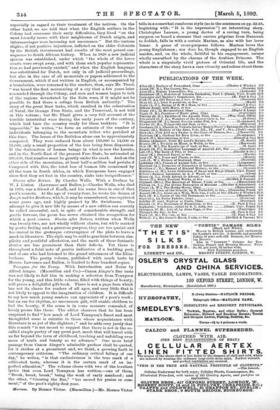was not likely to fail him in making a selection
from Tennyson
for the young, and this little volume, filled with things of beauty, will prove a delightful gift-book. There is not a page here which
has not its charm for readers of all ages, and very little that is not likely to appeal to the imagination of children. It is difficult to say how much young readers can appreciate of a poet's work ; but an ear for rhythm, no uncommon gift, will enable children to feel the beauty, if the sense is in some measure concealed, of lovely poems like these. The editor observes that he has been surprised to find " how much of Lord Tennyson's finest and most thoughtful verse is suitable to those whose acquaintance with literature is as yet of the slightest ;" and he adds very justly that this remark "is not meant to suggest that there is not in the so- called simple poetry of any great poet, much that will travel with us far beyond the term of childhood, teaching and unfolding ever more of truth and beauty as we advance." One more brief passage from Canon Ainger's admirable preface shall be quoted, for it strikes at a prominent and, we think, a growing fault in contemporary criticism. "The ordinary critical fallacy of our day," he writes, " is that exclusiveness is the true mark of a cultivated taste, whereas it is the certain mark of an im-
perfect education." The volume closes with two of the loveliest lyrics that even Lord Tennyson has written,—one of them, "Break, break, break," being the work of early manhood ; and the other, " Crossing the Bar," " too sacred for praise or com- ment," of the poet's eighty-first year.


































 Previous page
Previous page